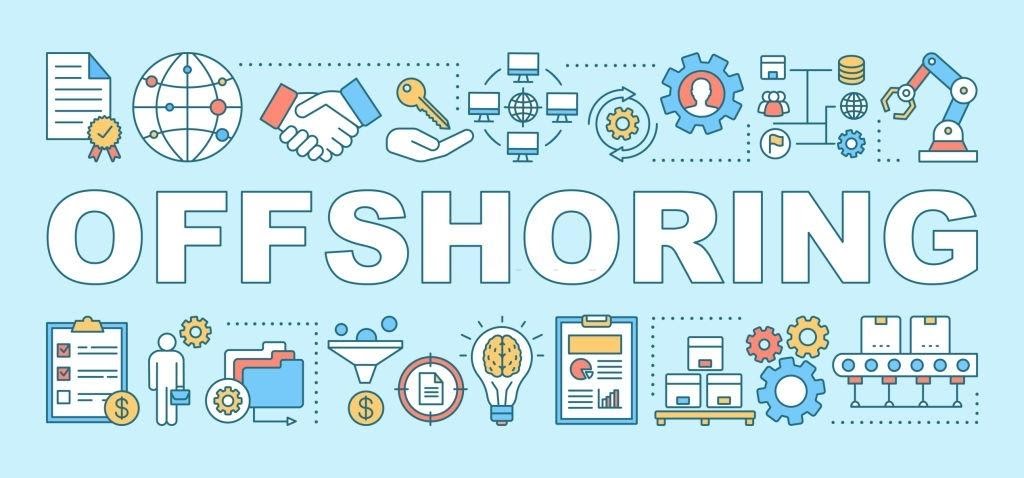

Quick Links
Quick Links
Outsourcing and offshoring are highly regarded strategies that allow companies to scale and improve their competitiveness in today’s business landscape. While both options can have significant benefits for your company, there are key differences between them.
If you’re thinking of using one of these business methods for your company, then it’s important to understand what sets them apart so you can make the most out of them.
In today’s blog, we’re taking a close look at outsourcing vs. offshoring—their differences, and their pros and cons. Let’s get started!
The Differences Between Outsourcing and Offshoring

Outsourcing refers to transferring an aspect of a company’s operations to a third-party service provider. This third party may be within the same geographical location (in the same country, city, or even street) or in a different country.
It is a practice usually undertaken to reduce costs including salaries for personnel, overhead, equipment, and technology. Moreover, it is often used by companies so they can focus on their core competencies by delegating less critical services or business processes outside of their organization.
As such, it can cover a wide range of business aspects including, but not limited to, customer support, back office, and manufacturing. For example, a small business may opt to outsource bookkeeping services in order to save on the costs of hiring an in-house accountant. Or a skincare brand may outsource the design of the packaging materials for their products.

On the other hand, offshoring involves transferring a company’s operations to another country. Businesses often do this to reap certain benefits such as cutting costs, reducing tax burden, and accessing specialized talent abroad. Moreover, offshoring allows a company to enter new markets much easier.
Unlike outsourcing, where the services are strictly provided by a third-party, offshoring allows companies to maintain direct control of their operations abroad. It could involve establishing an offshore branch office or setting up infrastructure in another country.
So the key differences between outsourcing and offshoring are:
- Location. Companies outsourcing services may find service providers within their country or city. Meanwhile, when a company offshores business processes, it involves going to another country.
- Control. Offshoring allows a company to maintain direct control of their operations, even if it is completed in another country. On the other hand, outsourcing involved relying on third-party providers.
- Driving Force. With outsourcing, the main driving force is to get access to expertise without ramping up costs for a company. Meanwhile, most companies offshore their business processes in order to overcome constraints in a company’s primary country.
- Key Objective. The key objective of outsourcing is to allow a company to focus on its core competencies. Meanwhile, offshoring focuses on lowering skilled labor costs.
- Persons Performing the Activities. With outsourcing, the persons performing the activities of the business are not employees of the organization. With offshoring, the persons performing the tasks and processes needed are employed by the company.
Pros/Cons of Outsourcing
Pro 1: Access to Expertise
Certain business processes require specialized skills that you may not already have in-house. Sometimes, these aren’t easy to learn, onboarding takes too much time, and hiring new people who are skilled in these areas isn’t always a cost-effective option.
Outsourcing allows you to complete non-core tasks thanks to third-party providers who can get the task done far more efficiently and more effectively.
Con 1: Giving Up Some Control
By outsourcing certain business processes, you have to put the quality of your work in the hands of another service provider.
You won’t have as much control as you would if these tasks are done in-house. While you can make suggestions or changes afterward, you really can’t monitor them while they’re in the middle of performing a task.
Pro 2: Focus on Core Competencies
With the help of outsourcing, your company can focus on tasks you understand. People won’t have to take on tasks that they’re not equipped for, anyway. By focusing on your core competencies, you can improve workforce and workplace productivity.
Con 2: Miscommunication Concerns
Maintaining a clear line of communication is one of the most important aspects of outsourcing work. The ramifications of miscommunication may be difficult to rectify, so you have to be clear about what your expectations are from the get-go.
Therefore, you need to leverage detailed project documents, collaboration and project management tools, and instant messaging and video conferencing software to actively prevent communication mishaps.
Pro 3: Reduced Costs
Outsourcing is a cost-effective way of acquiring specialized skills for your company. It reduces the costs of recruitment, onboarding, and other overhead. This is because third-party service providers already have everything needed to execute their work efficiently.
Con 3: Security Issues
IT outsourcing, in particular, comes with data security risks. Since you’re not keeping data in-house anymore, you’d have to be more vigilant when it comes to protecting your data. Hence, having data protection measures in place should be one of your biggest priorities.
Pros/Cons of Offshoring
Pro 1: Lower Costs
Offshoring has three main cost-saving benefits for a business. Primarily, it lets businesses save on labor costs. Some countries have lower average wages that a company can leverage.
In the same vein, offshoring can help lower operational costs because some territories have lower rent and electricity costs.
Lastly, offshoring can provide significant tax savings. There are certain countries that have company-friendly tax laws and even subsidies that can help your company save more money.
Con 1: You Might Need Legal and Taxation Experts
The tax savings that you can get from offshoring has one caveat: you need to fully understand the fiscal nuances of a country to avoid issues in the future.
You need the help of taxation experts in your target country to prevent making wrong decisions that can lead to getting fined or worse.
Pro 2: Access to a Larger Talent Pool
With offshoring, you’re not limited to the talent pool in your home country. You can take advantage of highly skilled professionals you can hire from across the globe.
Con 2: Collaboration Issues
Time and distance barriers can be a big concern when offshoring certain aspects of your business. Collaborating can be more difficult if the people you’re working with are several time zones away.
Furthermore, cultural differences including language can result in miscommunication down the line.
Pro 3: You Maintain Control
With offshoring, you don’t have to hand over the reins to another service provider just to complete the processes you need. This means you have greater control over the quality of work from start to finish.
Con 3: Requires Greater Levels of Monitoring
Control and monitoring go hand in hand. Offshoring entails deeper monitoring due to barriers such as distance, time, and culture. Regular check-ins are a must and you need to have reliable on-site managers to ensure that everything stays on track.
Deciding Which One is for You
When it comes to deciding whether outsourcing vs. offshoring is for you, there are certain factors you need to consider. This includes:
- How long you need the service. Outsourcing is great for services you need occasionally or for short periods only especially if they’re non-core tasks that only come up seasonally. It’s also a great option if you need to fulfill a request that you don’t have in-house skills for and will only need once.
- How quickly you need the service. With offshoring, you might still need to train people so there is a possibility that the service may not be carried out immediately. If you need something quick, you’re better off outsourcing services.
- Whether or not you need full control over operations and quality. If you are in the manufacturing business there are parts of your product that can be made cheaper by another facility and you don’t mind not having control over how they are made, then outsourcing is for you.
Meanwhile, if you want full control over every step of the way and you have the capacity to set up a factory overseas, then offshoring is for you.
- How confidential your information is. Outsourcing might not be an attractive option for companies handling sensitive information. If you need to meet certain confidential legal requirements, you have to conduct monitoring to avoid possible breaches down the line.
Conclusion
For many modern businesses, outsourcing and offshoring have become a crucial part of their strategy. For some, it has even become a tool that helps them scale their business better, improve productivity, and improve their positioning in a highly competitive global market.
Understanding how these two concepts differ as well as what they can do for your business can help you in deciding which option is for you.
Are you looking for more ways to make your business more scalable? Then check out the FreeUp blog for tips and tricks that can help grow your business!


